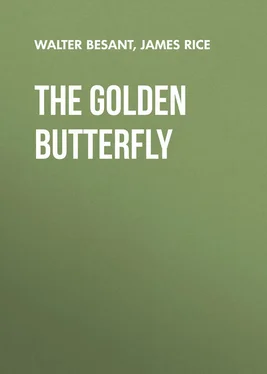Walter Besant - The Golden Butterfly
Здесь есть возможность читать онлайн «Walter Besant - The Golden Butterfly» — ознакомительный отрывок электронной книги совершенно бесплатно, а после прочтения отрывка купить полную версию. В некоторых случаях можно слушать аудио, скачать через торрент в формате fb2 и присутствует краткое содержание. Жанр: foreign_antique, foreign_prose, на английском языке. Описание произведения, (предисловие) а так же отзывы посетителей доступны на портале библиотеки ЛибКат.
- Название:The Golden Butterfly
- Автор:
- Жанр:
- Год:неизвестен
- ISBN:нет данных
- Рейтинг книги:3 / 5. Голосов: 1
-
Избранное:Добавить в избранное
- Отзывы:
-
Ваша оценка:
- 60
- 1
- 2
- 3
- 4
- 5
The Golden Butterfly: краткое содержание, описание и аннотация
Предлагаем к чтению аннотацию, описание, краткое содержание или предисловие (зависит от того, что написал сам автор книги «The Golden Butterfly»). Если вы не нашли необходимую информацию о книге — напишите в комментариях, мы постараемся отыскать её.
The Golden Butterfly — читать онлайн ознакомительный отрывок
Ниже представлен текст книги, разбитый по страницам. Система сохранения места последней прочитанной страницы, позволяет с удобством читать онлайн бесплатно книгу «The Golden Butterfly», без необходимости каждый раз заново искать на чём Вы остановились. Поставьте закладку, и сможете в любой момент перейти на страницу, на которой закончили чтение.
Интервал:
Закладка:
No one out at all except themselves. What joy! Phillis shut the door very carefully behind her, looked up and down the street, and then running down the steps, seized the happy Cæsar by the paws and danced round and round with him upon the pavement. Then they both ran a race. She ran like Atalanta, but Cæsar led till the finish, when out of a courtesy more than Castilian, he allowed himself to be beaten, and Phillis won by a neck. This result pleased them both, and Phillis discovered that her race had brought her quite to the end of one side of the square. And then, looking about her, she perceived that a gate of the garden was open, and went in, followed by Cæsar, now in the seventh heaven. This was better, better, than leading a pair of twins who sometimes tied knots with their legs. The gate was left open by the under-gardener, who had arisen thus early in the morning with a view to carrying off some of the finer tulips for himself. They raced and chased each other up and down the gravel walks between the lilacs and laburnums bursting into blossom. Presently they came to the under-gardener himself, who was busy potting a selection of the tulips. He stared as if at a ghost. Half-past five in the morning, and a young lady, with a dog, looking at him!
He stiffened his upper lip, and put the spade before the flower-pots.
"Beg pardon, miss. No dogs allowed. On the rules, miss."
"William," she replied – for she was experienced in undergardeners, knew that they always answer to the name of William, also that they are exposed to peculiar temptations in the way of bulb – "William, for whom you are potting those tulips?"
Then, because the poor youth's face was suffused and his countenance was "unto himself for a betrayal," she whistled – actually whistled – to Cæsar, and ran on laughing.
"Here's a rum start," said William. "A young lady as knows my name, what I'm up to and all, coming here at five o clock in the blessed morning when all young ladies as I ever heard of has got their noses in their pillowses – else 'tain't no good being a young lady. Ketches me a disposin' of the toolups. With a dawg, and whistles like a young nobleman."
He began putting back the flowers.
"No knowin' who she mayn't tell, nor what she mayn't say. It's dangerous, William."
By different roads, Montaigne wrote, we arrive at the same end. William's choice of the path of virtue was in this case due to Phillis's early visit.
CHAPTER V
"Te duce Cæsar."
Tired of running, the girl began to walk. It was an April morning, when the east wind for once had forgotten to blow. Walking, she whistled one of the ditties that she knew. She had a very superior mode of performing on that natural piccolo-flute, the human mouth; it was a way of her own, not at all like the full round whistle of the street-boy, with as much volume as in a bottle of '51 port, as full of unmeaning sound as a later poem of Robert Browning's, and as unmelodious as the instrument on which that poet has always played. Quite the contrary. Phillis's whistle was of a curious delicacy and of a bullfinch-like note, only more flexible. She trilled out an old English ditty, "When Love was young," first simply, and then with variations. Presently, forgetting that she was not in the old paddock, she began to sing it in her fresh young voice, William the under-gardener and Cæsar the dog her only audience. They were differently affected. William grew sad, thinking of his sins. The dog wagged his tail and rushed round and round the singer by way of appreciation. Music saddens the guilty, but maketh glad those who are clear of conscience.
It was half past six when she became aware that she was getting hungry. In the old times it was easy to descend to the kitchen and make what Indian people call a chota hazri , a little breakfast for herself. Now she was not certain whether, supposing the servants were about, her visit would be well received; or, supposing they were not yet up, she should know where to find the kettle, the tea, and the firewood.
She left the garden, followed by Cæsar, who was also growing hungry after his morning walk, and resolved on going straight home.
There were two objections to this.
First, she did not know one house from another, and they were all alike. Second, she did not know the number, and could not have read it had she known it.
Mr. Jagenal's door was painted a dark brown; so were they all. Mr. Jagenal's door had a knocker; so had they all. Could she go all round the square knocking at every door, and waking up the people to ask if Mr. Jagenal lived there? She knew little of the world, but it did occur to her that it would seem unconventional for a young lady to "knock in" at six in the morning. She did not, most unfortunately, think of asking William the under-gardener.
She turned to the dog.
"Now, Cæsar," she said, "take me home."
Cæsar wagged his tail, nodded his head, and started off before her at a smart walk, looking round now and then to see that his charge was following.
"Lucky," said Phillis, "that I thought of the dog."
Cæsar proceeded with great solemnity to cross the road, and began to march down the side of the square, Phillis expecting him to stop at every house. But he did not. Arrived at the corner where Carnarvon Street strikes off the square he turned aside, and looking round to see that his convoy was steering the same course, he trudged sturdily down that thoroughfare.
"This cannot be right," thought Phillis. But she was loath to leave the dog, for to lose him would be to lose everything, and she followed. Perhaps he knew of a back way. Perhaps he would take her for a little walk, and show her the Tower of London.
Cæsar, no longer running and bounding around her, walked on with the air of one who has an important business on hand, and means to carry it through. Carnarvon Street is long, and of the half-dismal, half-genteel order of Bloomsbury, Cæsar walked halfway down the street. Then he suddenly came to a dead stop. It was in front of a tavern, the Carnarvon Arms, the door of which, for it was an early house, was already open, and the potboy was taking down the shutters. The fact that the shutters were only half down made the dog at first suspect that there was something wrong. The house, as he knew it, always had the shutters down and the portals open. As, however, there seemed no unlawfulness of licensed hours to consider, the dog marched into the bar without so much as looking to see if Phillis was following, and immediately lay down with his head on his paws.
"Why does he go in there?" said Phillis. "And what is the place?"
She pushed the door, which, as usual in such establishments, hung half open by means of a leathern strap, and looked in. Nobody in the place but Cæsar. She entered, and tried to understand where she was. A smell of stale beer and stale tobacco hanging about the room smote her senses, and made her sick and faint. She saw the bottles and glasses, the taps and the counters, and she understood – she was in a drinking-place, one of the wicked dens of which her guardian sometimes spoke. She was in a tavern, that is, a place where workmen spend their earnings and leave their families to starve. She looked round her with curiosity and a little fear.
Presently she became aware of the early-risen potboy, who, having taken down the shutters, was proceeding about his usual work behind the bar, when his eyes fell upon the astonishing sight of a young lady, a real young lady, as he saw at once, standing in the Bottle and Jug department. He then observed the dog, and comprehended that she was come there after Cæsar, and not for purposes of refreshment.
"Why, miss," he said, "Cæsar thinks he's out with the two gentlemen. He brings them here regular, you see, every morning, and they takes their little glass, don't they, Cæsar?"
Читать дальшеИнтервал:
Закладка:
Похожие книги на «The Golden Butterfly»
Представляем Вашему вниманию похожие книги на «The Golden Butterfly» списком для выбора. Мы отобрали схожую по названию и смыслу литературу в надежде предоставить читателям больше вариантов отыскать новые, интересные, ещё непрочитанные произведения.
Обсуждение, отзывы о книге «The Golden Butterfly» и просто собственные мнения читателей. Оставьте ваши комментарии, напишите, что Вы думаете о произведении, его смысле или главных героях. Укажите что конкретно понравилось, а что нет, и почему Вы так считаете.












